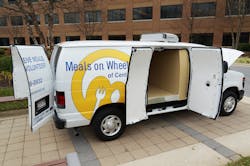Manager: Silas Fuller
Title: Operations manager
Company: Meals on Wheels of Central Maryland
Operation: Delivering meals to homebound senior citizens and other folks in need via a fleet of 28 vehicles
Problem:
When you work for a charity organization, every dollar saved from operations is a dollar that can be turned over to provide more services.
In the case of Meals on Wheels of Central Maryland, though, vehicle needs ate up operational dollars in terms of fuel and maintenance expenses—and that’s before acquisition costs were factored in.
“The mission of Meals on Wheels is to keep aging people living independently at home and we do that by providing home-delivered nutritious meals,” explains Stephanie Archer-Smith, executive director for the nonprofit. “The more efficient our vehicles are, the more meals we can serve to homebound individuals.”
The age of the Meals on Wheels fleet, which numbers 28 vehicles including vans and pickup trucks with specially-constructed stainless steel food delivery bodies, posed one of the big problems for Silas Fuller, the charity group’s operations manager. The older models not only burned more fuel but broke down more frequently.
So, Fuller was faced with several tasks: modernize the Meals on Wheels fleet, make it more efficient by lowering operating costs, and increase vehicle uptime.
Solution:
Fuller and Meals on Wheels turned to Element Fleet Management (formerly PHH Arval) to come up with a better vehicle specification aimed at attaining such savings.
The first step involved switching to a vehicle lease model. This saves capital dollars and also allows the charity to obtain four new vehicles per year versus the two per year under its direct ownership strategy.
Rich Zambroski, Element’s truck excellence manager, then stepped in with a brand new van spec with plug-in shore power capability to help reduce both fuel use and engine wear and tear.
Using Ford E-Series vans as a base platform, Zambroski tapped Sub Zero Insulation & Refrigeration Technologies in New York, one of Element’s suppliers, to craft a split configuration interior for the van.
The part nearest the driver would contain the refrigerated section. A Thermo King V-200 reefer unit mounted to the vehicle’s roof keeps that area cool. The rear of the vehicle features an oven, powered by auxiliary power, for heating meals.
Zambroski adds that both the hot and cold zones of the van can be connected to electric shore power. This means that the vehicle’s engine is no longer needed to cool or heat the van’s interior sections, saving fuel and reducing engine wear and tear.
“That’s the biggest part of the maintenance savings with the new vans right there,” he notes, pointing out that by moving to the new spec, Meals on Wheels cut its fuel and maintenance expenses 8%.
“Eliminating engine idling really saves on maintenance in the long term,” Zambroski stresses.
He adds that it took about a month to develop the new specs, which were developed using information from both the fleet’s operation and Element’s suppliers.
“The other benefit is that the lighter weight of this solution helps extend the geographical range of the vehicle as well,” he says.
In the end, Meals on Wheels redirected the money that was saved towards its primary mission of preparing and delivering over 800,000 meals a year. With the savings, the organization has been able to deliver an additional 1,000 meals a month. The nonprofit also provides grocery shopping services.
“That money means more meals on the street and more miles we can cover to deliver them,” says Jan Heifner, the charity’s CFO.
About the Author
Sean Kilcarr
Editor in Chief
Sean Kilcarr is a former longtime FleetOwner senior editor who wrote for the publication from 2000 to 2018. He served as editor-in-chief from 2017 to 2018.
